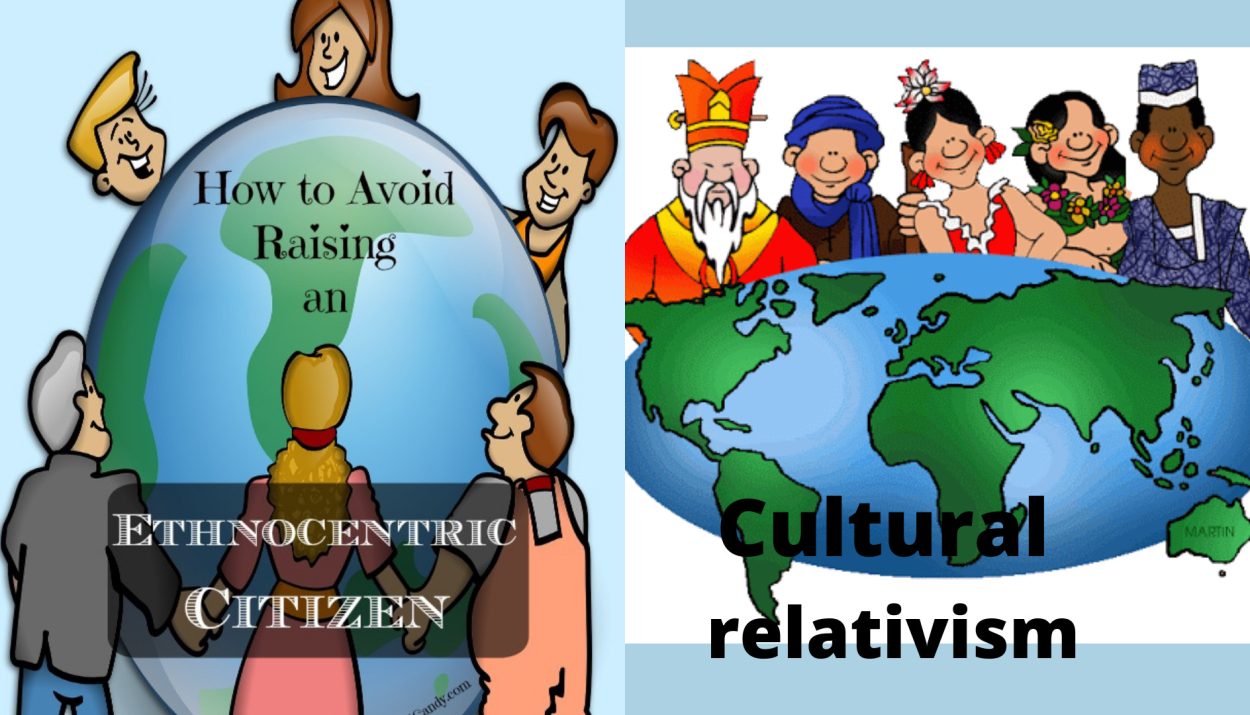The article “Ethnocentrism and Cultural relativism- Is everyone the same as you?”, explains the concept of ethnocentrism and cultural relativism and how both are related to each other.
Ethnocentrism
Ethnocentrism is a belief that one’s culture is centrally more important and superior to others. Ethnocentric people value their own culture and judge other people’s cultures and customs. One important thing that we have to understand about ethnocentrism is that it leads to cultural misinterpretation and it affects how we communicate with each other.
Ethno means culture and centrism means centre- this implies that one keeps its culture in the centre and judge the other’s culture from his perspective. The central culture is superior while the culture far from the centre is inferior.
Examples of Ethnocentrism

- People of urban areas consider tribal society as inferior in the context of culture.
- Nazi Germany– Adolf Hitler believed that Aryans were superior to Jews. This led to a mass massacre there.
- Religious conflicts– one consider his or her religion as the most superior and the values of other’s religion as inferior.
Disadvantages of Ethnocentrism
Ethnocentric people never put themselves in other people’s shoes to understand their culture. They only judge the values of other’s cultures according to their thoughts. This shows that they have biased perceptions regarding other’s cultures.
This perception leads to war, intolerance, bullying, discrimination etc. For eg., slavery and discrimination between blacks and whites in the USA. This is because of a lack of understanding and communication. Whites always consider themselves superior to blacks.
Ethnocentrism obstructs inter-cultural relations. Co-operation is important for survival. This attitude affects the process of assimilation. It blocks the growth of knowledge as there is no cultural communication.
Advantages of Ethnocentrism
Ethnocentrism is not always harmful. It has positives points also.
It helps in the prevention of the disintegration of society to a large extent. It decreases the conflict among the same culture. It helps in the progress of a The concept of nationalism shows that we value our own nation’s customs. This kind of nationalism is good until we don’t disrespect the values of other nations. This is positive and planned ethnocentrism. society.
The concept of nationalism shows that we value our own nation’s customs. This kind of nationalism is good until we don’t disrespect the values of other nations. This is positive and planned ethnocentrism.
This is important for devotion to one’s society. This encourages loyalty and patriotism towards one’s own culture and society.
It is important to understand the different cultures of the world by putting ourselves in one’s own culture because of our diversity. Every culture and society should study according to its context. So, here the concept of ethnocentrism is not very useful. To overcome this drawback, Franz Boas develop the concept of cultural relativism.
Different environments = different lifestyles = everything is related
Cultural relativism
Cultural relativism explains that every culture is related, no cultural norm is superior or inferior. It has cultural acceptance and awareness. The study of one culture should be separated from another culture.
Various examples show that some customs of a particular culture is acceptable but there may be a possibility that those same customs are unacceptable in another culture.

The study of culture should be based on a person’s own culture without any kind of judgement and biasness. It became an important tool to counter the ideas of ethnocentrism.
Examples of Cultural relativism
- Polygamy– In many societies, monogamy is followed but the practice of polygamy is also acceptable in some cultures. How polygamy is acceptable let us understand it, through the sex ratio. Suppose in particular area females are more in comparison with males so there the concept of polygamy is practical. It is not considered inferior or superior.
- Nudity– In many tribal societies, nudity is normal. It is part of their traditions. It does not relate to the sexual invitation.
- Development of tribes– The development of tribes occurs in their natural environment. Here the aim of development is not to bring them to an urban area but to develop them according to their own culture. They also developed but in a different way.
One should respect every cultural practice and custom as we have different resources available.
Importance of Cultural relativism
It is important to learn about unknown people and cultures. It eliminates the misinterpretation of a particular culture. It helps in understanding cultural diversities.
It does not make value judgements on another culture. It helps to analyse culture objectively.
There is no biasness as in the case of ethnocentrism. There is respect for every culture.
Issues with cultural relativism
There will be no criticism if we consider every cultural practice as valuable. There will be no change of removal of social evils such as Sati Pratha, Dowry, Abolition of widow remarriage, human hunting etc.
This leads to no improvisation as we accept practices of every culture. There will be no comparison among the different cultures. There will no benchmark to evaluate universal cultural norms. There are always some negative practices that occur in every society which should be removed.
Conclusion
This concludes that there is no point where we can criticise any particular culture so whatever we have presented, should be respected in its way. We should just remove the social evil practices by respecting every culture.
Read more:
- The Maharaj Libel Case of 1862: A Landmark in Colonial Legal and Social History
- Acclimatization: The Subtle Dance Between Humans and Their Environment
- The Anthropology of Sleep
- Lamarck’s Theory of Evolution
- Bipedalism and Structural Changes







